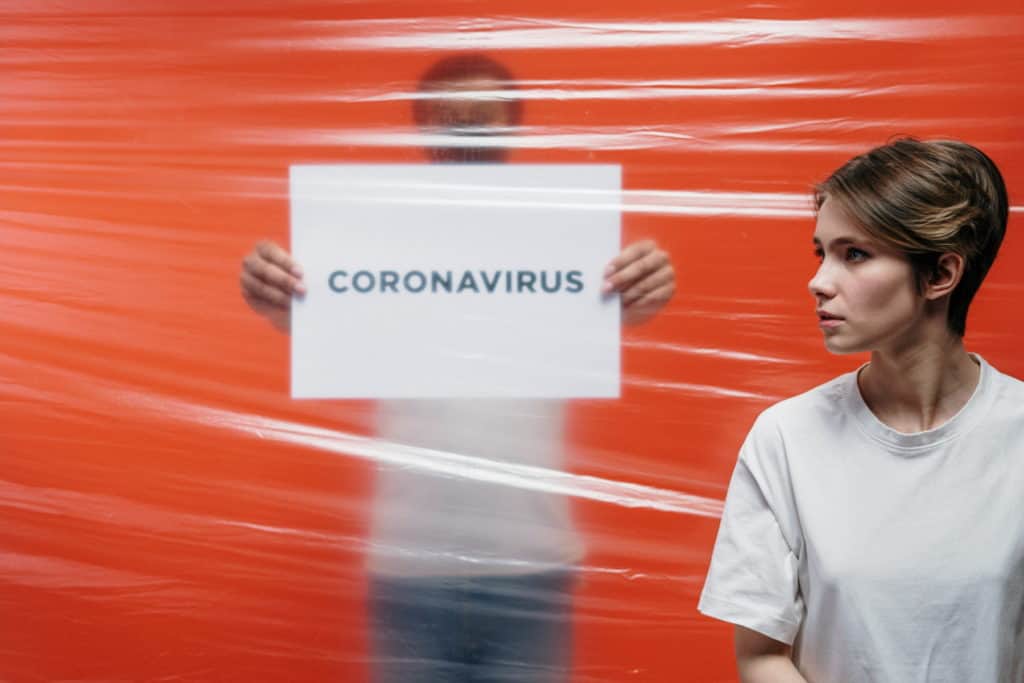
A scary situation people are worried about is if someone contracts the Coronavirus in their apartment building. It feels like you are living in such close proximity you just want to get away, but you can’t. And it FEELS like you are going to get the virus yourself and maybe spread it to others if you stay.
So, what should you do? Leave and try to find somewhere else to ride this thing out? Or just stay in your current apartment and follow the guidelines the CDC put out regarding tenants in apartments?
The good news is that if you follow their regulations, wash your hands, limit your contact with other people, and don’t leave your apartment, you have virtually no chance of contracting the virus from inside your apartment.
You have to come into contact with other people, or where other people have just been to pick it up.
I recently wrote an article “Can I Get Coronavirus If I Stay In My Apartment”. I go through the guidelines the CDC put out specifically regarding the coronavirus and how it impacts people who live in apartment buildings.
But what if you hear that someone a couple floors above you apparently has the Coronavirus? How many people did THEY infect before they were tested? Could YOU have touched something they touched? What about going forward? Should you stay in your apartment or leave and go someplace else?
These are all great questions, which we will address in this article.
What If Someone In My Apartment Building Has The Coronavirus?
There are several things this depends on…
How Prepared Are You For The Coronavirus?
Do you have enough food and essentials to ride out the next month or so, or however long this lasts? If you don’t need to go out anywhere, you are more than likely going to be perfectly fine.
The virus can’t travel through the ventilation systems in apartment buildings, and you would have to be in close proximity to someone else who is infected to get it. Or touch a doorknob they just touch, or something akin to that.
If you have taken proper precautions, have cleaning supplies, been taking good care of your own personal health and safety, and turned your apartment into a Coronavirus-free zone, then you are doing about all you can do individually to prevent contracting the illness.
Now, if the person that was infected is someone you talk to and have close contact with on a regular basis, then at the very least, you should self-quarantine yourself in your apartment for no less than 14 days. You should also call the health department or doctors office or hospital who is handling the infected person’s case to let them know that you have been in contact with them recently and are self-quarantining.
You don’t need to take a test if you don’t need to, as they are currently hard to come by. But if you start developing symptoms, then you should call your medical provider and ask them what they would like you to do as you believe you could have contracted the virus.
The primary thing to do at that point is to ensure that you don’t spread it to any more people during your time in treatment and recovery.
How Old Are Your Residents?
This is a relevant question with the Coronavirus. If you are living in a building that has a predominantly older population, then more concern is going to be prudent at this point. Older population tend to congregate more with each other and share things like meals and conversation on a more interpersonal level. The chance for it to spread and be quite bad in older people is what should make you take pause.
Houston had a case like this earlier in the week where there was an apartment building that housed people primarily 55 and over. A dozen residents tested positive for Coronavirus, so the health department implemented some pretty strict regulations regarding the situation.
People could leave that same day, but they would have to self-quarantine for at least 14 days no matter where they decided to go. The rest of the people are going to be essentially locked in their apartment building, with nobody coming and leaving for 2 full weeks.
Basically, they were treating the apartment building like a cruise ship. As the people moved around and had contact with all of the other residence, chances are they spread it to many other tenants as well. The only prudent thing to do was to lock down the apartment building for the safety of the residence and the public in general.
While only 12 people out of the 235 tested positive for the virus, virtually every single resident had direct contact with someone who was positive for the virus. They took these actions based on the age of the tenant, and how much contact they had had with each other during the previous days.
What Is Your Landlord Or Manager Doing?
If someone at your complex has been tested positive for the Coronavirus, it should be the responsibility of your landlord to get the information of who and where the positive test originated in.
This communication is essential to let other residents know what areas and people they need to remain distant from and allow them to prepare themselves and their apartment for a deeper response.
If you haven’t received communication from your manager or landlord about the Coronavirus and are concerned about it, just give them a call and ask what procedures they are going to use to keep their tenants updated on the coronavirus situation.
How Long Should I Stay In My Apartment If I Have Coronavirus?
Based on guidance from the Centers For Disease Control (CDC), you should remain in your apartment, with no contact with anyone, if possible, for no less than 14 days from when you were diagnosed with Coronavirus.
The data shows that the average time the virus stays in human body is around 14-20 days. It is assumed that one you have symptoms severe enough to be tested, the virus has already been in your body for a few days already. The 14 day period is what is recommended to keep other people safe from contracting the virus.
Remember that if you DO end up contracting the coronavirus, it is ESSENTIAL that you STAY in your apartment because even if you do not have the worst of the symptoms, you can give it to countless other people. These people can give it to other people, and the more contract the virus, the more people are going to be infected with compromised immune systems and are going to become seriously ill or die.
Staying in your apartment for 2 full weeks without any contact with the outside world presents its own challenges. This is why Apartment School has been recommending that you have enough food and dry goods to last you at least a couple of months in your cupboards.
Should I Tell My Landlord I Have Coronavirus?
Yes, you ABSOLUTELY should tell your landlord you have coronavirus. It is your obligation to other humans that you give them the knowledge that they can use to keep safe in their own apartment.
This isn’t a knock against you personally if you get it. People are going to be concerned for you and your health. Contacting your landlord helps them coordinate the response of everybody else in the complex.
Ask yourself if you would want to know if your neighbors had this virus and how you would respond if you found out they did and didn’t say anything. This would be socially irresponsible and potentially deadly to other people by NOT saying something.
If you have symptoms and end up getting diagnosed with the Coronavirus. Make sure someone calls your landlord or your manager so they can notify the rest of the people in your apartment building.
Other people you may have had contact with may have contracted it, and the tenants that haven’t contracted it will want to know so they can even better prepare themselves and their apartments.
Apartment School politely requests that anyone who is diagnosed with Coronavirus tell their landlord immediately of the situation.
If someone in your apartment complex contracts the Coronavirus, make sure that you have been following our other articles on how to stay safe in your apartment from the Coronavirus. Make sure you are washing your hands, not touching commonly touched items, and maintaining social distancing.
If YOU contract the Coronavirus, make sure to tell your landlord or manager that you have it in order that they can plan a response for other tenants and give them the knowledge that is necessary to keep other people safe as well.
